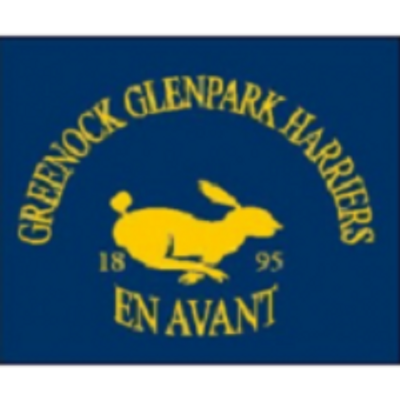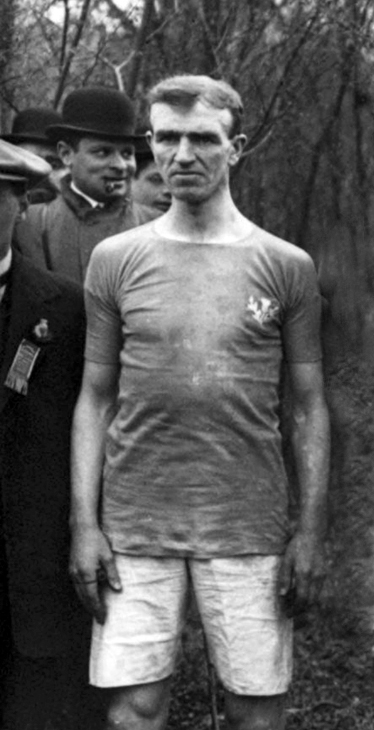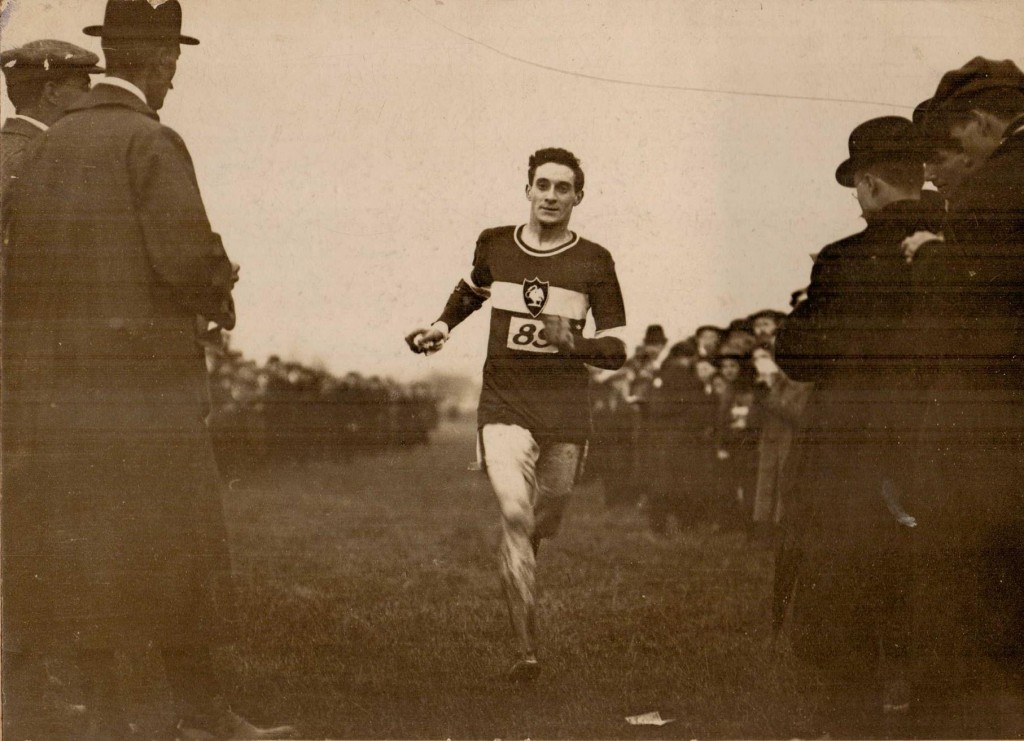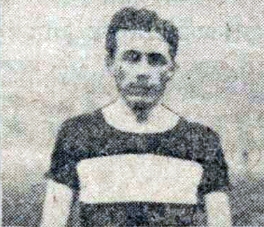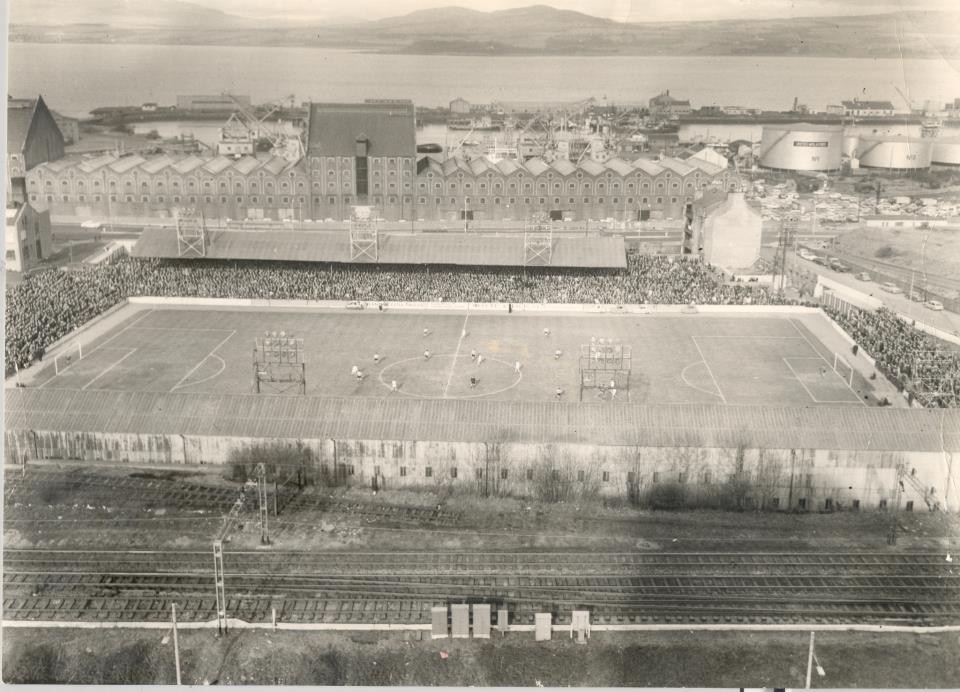The Greenock Glenpark Harriers crest
Everybody knows something about the sports meetings held by the big football clubs – Rangers, Celtic, Queen’s Park, etc, and there are works meetings such as the Babcock and Wilcox Sports at Renfrew and Dirrans Sports in Kilwinning but knowledge of the Greenock Glenpark Sports in the athletics community is strictly limited. Held on the last Saturday in July, it was the start of three weekends of athletics meetings that drew big crowds. Rangers Sports were on the first Saturday in August and Celtic on the second Saturday. Held at Cappielow Park, home of Greenock Morton FC, they drew crowds of up to 11,000 spectators and attracted athletes from England, Ireland and even further field at times. In the 1920’s such athletes as Eric Liddell were annual competitors at the meeting, but in the period before that the 1914-18 war made athletics difficult but the committee of the club did well and the meeting was held every year of the war. We start this section in 1914 with a report from the ‘Glasgow Herald’.
“An unusually varied programme and the presence of several well-known competitors from England and Ireland attracted fully 5000 spectators to the athletic meeting of Greenock Glenpark Harriers at Cappielow Park on Saturday. The weather was fair but cold, a strong breeze prevailing throughout the afternoon. The wind favoured the sprinters and fast times were registered in the Heats of the 100 yards handicap, while the Final was won from scratch in a shade under 10 seconds. The Irish champion, FRS Shaw, was a popular winner in this event and he also qualified for the final of the 220 yards, but to the disappointment of spectators, he was prevented by sickness from competing. HJ Christie, who won his Heat easily, secured a narrow victory in the Final in which he improved his earlier time by a second. In the three miles invitation handicap, FJ Ryder, Clonliffe Harriers, gave a fine exhibition of staying power and speed. Starting from scratch, and conceding starts up to 280 yards, he gradually overtook a large field and won by 10 yards from W Brodie, Paisley YMCA Harriers, the winner of the two miles handicap at Ayr the previous Saturday. Along with Ryder on the scratch mark, were GCL Wallach, ex-champion at four miles, and James Wilson, the ex-champion. The trio kept together for fully two miles when Wallack fell back, and a little later Wilson also lost ground. In the last lap Ryder made his effort, and with a fine burst of speed, overtook the field finishing strongly, as stated. E Glover, Hallamshire Harriers, was entered for both the mile and the three miles but he did not compete. Duncan McPhee. the Scottish half-mile and mile champion, was also an entrant for the three miles, but reserved himself for the shorter distance in which he secured third place from AG Lang, Greenock Glenpark, and WP Brown, Glasgow YMCA Harriers. Wallach also ran in the Mile, reserving 30 yards from McPhee but he was unplaced, securing however the prize for the first Glenpark man home after the three placed men. The relay race proved an easy victory for the West of Scotland Harriers. More than ordinary interest was imparted to the two miles walk by the presence of the English champion, R Bridge. With the limit man 350 yards away, Bridge walked at a very fast pace throughout and finished half a lap ahead of the Scottish champion, Alex Justice, and finished in the very fast time of 13 min 57 3-5th sec, only 2-5th sec outside the Scottish all comers record.”
Held on 25th July, the sports were a great success with more than ten events plus the usual five-a-side competition in which Rangers beat Celtic 1-0 in the final. The local club did well – in the relay they were second to the West team with Clydesdale Harriers third, the winner of the handicap mile, and finalists in almost every event.
GCL Wallach
By July 1915 hostilities had been joined and the war was well under way but a sports meeting was held organised by Glenpark on 31st July. Under the heading of Greenock Glenpark Harriers, the report read:
“An athletic meeting was held in aid of dependants of soldiers and sailors was held at Cappielow Park on Saturday afternoon. The promoters were the Glenpark Harriers, and the meeting was under the patronage of Sir Hugh Shaw Stewart, Bart; the Lady Alice Shaw Stewart, the Provost, Magistrates and Town Councils of Greenock, Gourock and Port Glasgow; the Directorate of the Morton Football Club; the military and naval officers stationed in Western Renfrewshire, and a large number of prominent people in the district. The programme embraced no fewer than eleven events, in addition to races for the Boy Scouts and the Boys Brigade, and the open and invitation events were supported by nearly all the Scottish runners and a number of well-known English and Irish competitors. The military marathon race, for teams of twelve, attracted an entry of thirteen teams. Competitors were required to cover a course of about 10 miles in miltary equipment, each team travelling and finishing as a unit. The winning team proved to be one of those representing the 8th Provisional Battalion, HLI, who also furnished the runners-up, there being less than a minute in the times of the two teams. In the two miles walking handicap, R Bridge the English champion gave a good exhibition of his unique talent, conceding starts of up to 350 yards, and winning by fully 200 yards. Two of the invitation events, the quarter and the halfmile were won by G Dallas, Maryhill Harriers, who was followed in the shorter distance by GH Gray, of Salford Harriers, the winner of the hurdle race. The latter event was over a distance of 220 yards, instead of the more usual 120, and the English champion was able to concede 16 yards to HD Soutter and won y a yard.
Fine weather prevailed and there was a crowd of 8000, the drawings at gate and stand amounting to about £300. To this is to be added the sum of £45:1:9d, being the amount of a subscription amongst the workers in the Greenock Torpedo Factory.”
It is surprising that such meetings were able to be conducted thorughout the war period, albeit that the fields were a bit restricted because of the numbers on active service, but every did their bit and the money raised was put to good use. The military marathon was a bit more of a challenge tha some of the events restricted to serving personnel – some were normal events (100 yards for soldiers only), others were more specific to the cause (‘stretcher races with a ‘body’ strapped to the stretcher), and some were simply displays. On the same day there were sports at Tynecastle in Edinburgh ehere there were 11,000 spectators and drawings were £270 which went to the Red Cross Society
R Bridge appeared on the programme as ‘London Walking Club and Glenpark Harriers’, and FJ Ryder, again from scratch, was second to a Glenpark runner to who he was conceding 295 yards.
James Wilson
The 1916 version of the Greenock Glenpark Sports was held on 29th July and instead of a report as such on the meeting, the ‘Glasgow Haerld’ commented at length in its ‘Notes on Sports’ column.
“It says much for the influence of Mr William Struthers, of Glenpark Harriers, that he is able to attract to the annual gala of his club so many visitors from England and Ireland. The presence of such notable performers as Corporal Gamble of the Irish Guards, Bridge, the champion walker of England, Lieutenant Taylor, the rival of Applegarth, Gray, the famous hurdler, and Ryder of Ireland gave distinction to a full and varied programme. Of those mentioned, only Gamble met with any great success. He ran a magnificent race in the half mile and won on the tape after finding himself rather curtailed for room at the bend into the home straight. He is a splendid specimen of athletic manhood, big of body and lithe of limb, and his pace and action are a delight to the eye. Bridge did not feel too well after a night of travelling, and had to retires owing to that vexatious athletic infliction commonly known as ‘stitch’. In any case he would have had to make a supreme effort to overtake the Scottish champion, Justice, who walked with great determination and pace and ultimately finished an easy winner. Then Gray did not seem enamoured of the line of hurdles running diagonally across the pitch and did well to finish close up to Soutter of the promoting clubin the good time of 15 sec. Wilson, the Scottish champion, a slim and graceful runner, had a splendid victory from scratch in the three miles handicap, in which he had more trouble in disposing of Lance Corporal Ross, the winner at Ayr, than in defeating such notabilities as Wallach and Ryder. The dapper little Salford Harrier, Shelmardine, shone at the shorter distances. A very nondescript Celtic five were defeated by Morton, and a team of Royal Scots Fusiliers, captained by the well-known athlete Sergeant Gutteridge, won the military marathon. In view of the enterprise displayed by the promoters, it was gratifying to find the attendance of 7000 present, so that the local war funds will substantially benefit.”
The military marathon had been cut in half from the revious year, being held over only five miles in 1916. The William Struthers mentioned was a hard working and highly respected official throughout Scottish athletics: he had been president of the SCCU in 1912-14 and would go on to be president of the SAAA in season 1922-23.
Duncan McPhee
There were three fixtures on 28th July, 1917 – Greenock Glenpark, Edinburgh and the professional meeting at Shawfield organised by Clyde FC. As the war progressed so thenumber of events was reduced – partly because so many men were being sent to the front line to fight in the bloody battles of the 1914-18 War, partly because travel to meetings was difficult and partly because time was not available for training. Nevertheless the Greenock meeting attracted a crowd of 5000 on a bright, sunny, July afternoon at Cappielow. “Despite the absence of sporting celebrities from the fields of the south, the attendance was as large as ever and this was particularly gratifying in view of the subject to which the proceeds are to be devoted – The Greenock Sailors and Soldiers Families Association. It was once more made evident that sporting interest does not so much depend on individual distinction as upon a certain equality of ability which ensures keen competition and engenders liveliness. As so often occurs, members of the organising club figured prominently in the prize list: indeed they won three of the four open events. LA Osborne was a double winner, and ran with great brightness and life in the hundred and furlong. It was pleasing to find J Wilson, the Scottish four miles champion, successful in winning the half-mile, and for a time he looked like emulating Osborne’s feat by adding the two miles to the shorter distance, but a magnificnt finishing dash by Ross, the Edinburgh runner, deprived the local man of the double distinction. Military items bulked largely in the programme, and as usual the aid of football was invoked to attract and entertain the crowd. Our experience this season has been that these football tournaments are generally tedious because of their length, and uninteresting because of the incapacity of the average player to adapt himself to changed conditions. Most programmes would gain if the entries were limited to four or five teams as was the case at Cappielow. “
The programme was reduced to five events (heats for the sprints) plus the football, and the military marathon was now limited to the 3rd Royal Scots Fusilers, and run over six miles. Winners were H Company, G Company and F Company; the five-a-sides were won by Celtic (1-0) over a Military Five, from Maryhill.
*
In 1918, still suffering from the exigencies of the war, the sports went ahead on 27th June. There were several small scale meetings on that day and Glenpark’s was one of them. “There was a large number of sports meetings promoted by a great variety of organisations. For reasons connected chiefly with past history, the gala of Greenock Glenpark Harriers may be given pride of place. It attracted a fine crowd, who were for the most part pleased that members of the home club figured so prominently in the prize list; for instance they monopolised all the laurels in the furlong. It must be confessed that there is a tendency to sameness about athletic programmes these days – seldom is there any novelty in regard to the personel of the competitors or the nature of the competition, so that the appearance of GCL Wallach, a “pre-war Scottish champion” at Cappielow was a welcome variation from the ordinary. He ran well in the two miles but was unable to overtake Cuthbert, who finished in dashing style. The Railwaymen’s Union had a successful gathering at Ibrox Park which should be of substantial assistance to the Orphan Fund. The sport calls for little comment.”
There were five events (with heats in the 100 and 220 yards) and a five a side in which St Mirren beat Rangers 2-0. The crowd totalled 8000 so the money raised for the families of serving members of the forces would have been considerable. At Ibrox there were five events plus a tug o’war (won by Bargeddie and a five-a-side in which Vale of Clyde beat Benburb 3-0. The Glenpark meeting with international runners taking part and lots of locals was clearly the meeting to be seen at. It should be noted though that,as had been the case all along, the professional meeting at Shawfield, organised by Clyde FC had a much bigger crowd than any of the others with 20,000 in attendance on this weekend. It also had the best five-a-side with Rangers beating Clydebank in the final by 2 – 0.
Cappielow Park, Home of Greenock Morton FC
After the war, on 26th July, 1919, matters were starting to get back to normal as was shown by the report in the ‘Glasgow Herald’. Glenpark Harriers meeeting at Greenock on Saturday recalled some great athletic meetings of former days when the most famous amateur performers from England, Ireland and abroad came to the west of Scotland. Among the competitors at Cappielow were two from New Zealand, one from Canada and several from England. The presence of the Colonials in this country is, of course, due to the war, all three being members of the fighting forces, and it was an excellent idea of the Glenpark management to persuade them to compete. Their running imparted distinction to the meeting, which otherwise could hardly have reached the standard usually associated with Greenock. The entries were not numerous, and some of the more prominent runners were engaged elsewhere but Sergeant Mason, Sergeant Lindsay, Sergeant Phillips and AM Nichols made amends for much and the meeting will stand out as one of the most interesting of the season. Mason, who won the half-mile, is a commanding personality and a runner of exceptional ability.
The first Heat had little more than started when it became apparent that none of the other runners could stay the pace he set. He won as he liked in 2 min dead, and in the Final he improved to the extent of four fifths of a second, and left the impression that he could have done much better if necessary. It is true that he was challenged in the straight by I Dobbie to whom he was conceding 35 yards, but the New Zealander found with no apparent difficulty the extra pace necessary to secure first position by a substantial margin.
No fewer than three Scottish champions were among the competitors – Sergeant Phillips, J Wilson and AH Goodwin. The Canadian, who gained championship honours at Parkhead two weeksa month ago, did not start in the half-mile handicap but he rendered useful service to Glenpark, of which club he is a member, in the relay race, and he won the invitation quarter-mile from scratch, beating Mason narrowly in the last ten yards. It was a matter for regret that the latter did not start in the invitation mile, as his running in the half-mile suggested that he would have given a good account of himself. AH Nichols of the Surrey AC, was also a non-starter but he was reserving himself for the three miles in which he out distanced the field in the early stages and ran the last lap like a quarter miler. James Wilson, the four miles champion, and GCL Wallach, an ex-champion, ran together for a time but the latter tired early, and Wilson had to go on alone most of the way. Of the home competitors the most successful was A Forrester, of the promoting club, who captured the 100 and 220 yards open handicaps. Maryhill narrowly beat Glenpark in the relay race, though but for a faulty exchange in the furlongs, the Greenock team might have had the better of the champions. The meeting was well handled and finished ahead of schedule with the final of the football tournament a win for the home five sending the crowd home in a good humour.”
Sergeant Phillips of Canada ran in the 800m in the 1924 Olympics in Paris. The initiative shown during the period of the war and in its immediate aftermath would be shown to good effect in the 1920’s and would culminate in a match between Scotland and Canada at the Glenpark Harriers Games.
